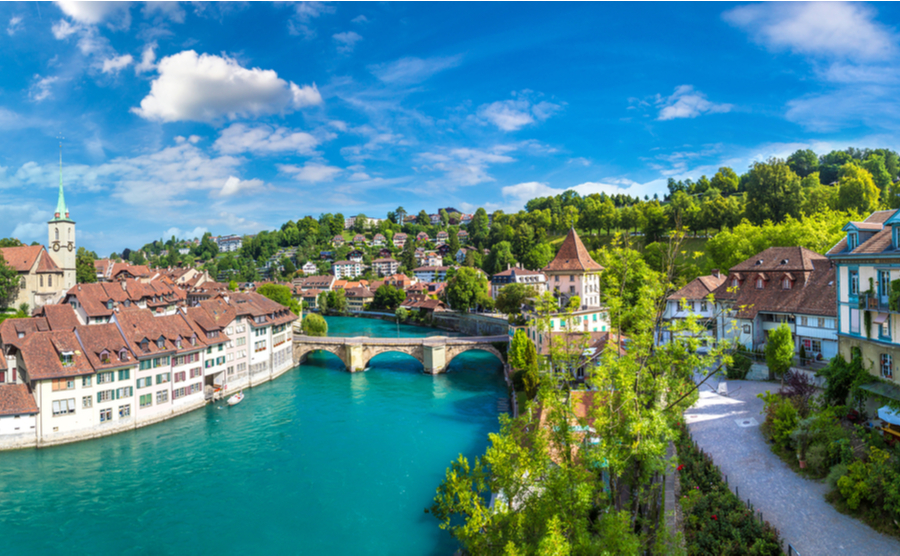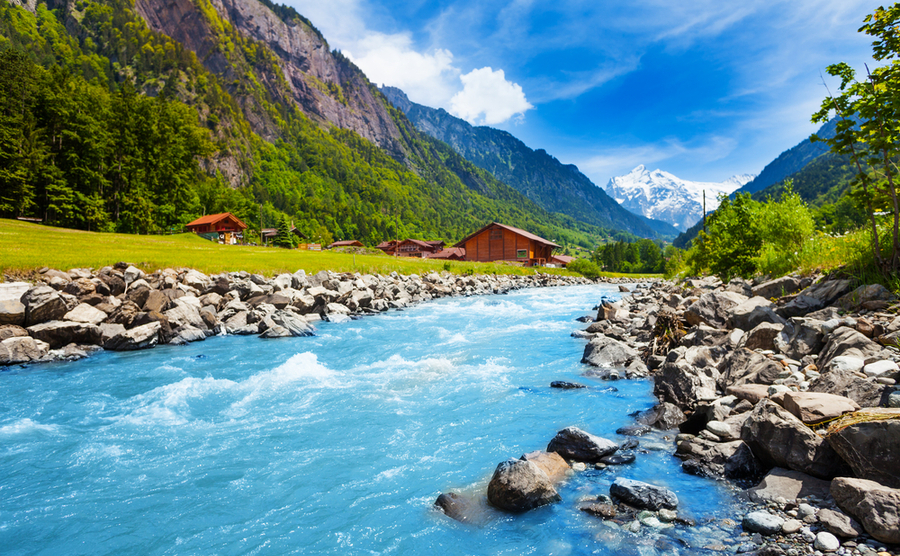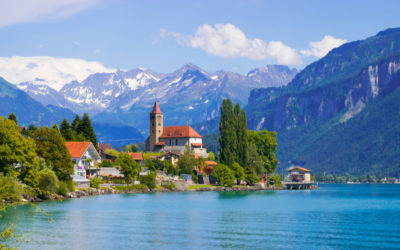Why move to Switzerland, and how you do it
Not so long ago, Switzerland was graced by the UK’s most famous, talented and beautiful people. People like Elizabeth Taylor and Richard Burton, David Niven, Noel Coward, Julie Andrews and Roger Moore. The reason, of course, was tax.
But while UK taxes aren’t quite so punitive these days, there are still great advantages in moving to – or just buying a second home – in Switzerland. Plus, as a member of the Schengen zone, a Swiss visa could be your key to 26 EU countries. Here are seven reasons to move to this beautiful country.
1. Liveability
Both Zurich and Geneva regularly make it into the top ten most “liveable” cities according the Mercer Quality of Living Survey. This is based on 39 factors including health and the environment, transport and public services.

Cities like Geneva, Zurich and Bern regularly rank as some of the most liveable in the world.
2. Low property buying costs
According to government statistics, the cost for buying a property, including registration costs, estate agent’s fee, legal fee and sales transfer tax, is only around 6% of the overall purchase price. This is one of the lowest buying costs in Europe and beyond.
3. Winter sports
Obviously, snow sports in Switzerland are enjoyed by all ages and include ice skating, skiing and snow-boarding. There are around 40 ski resorts dotted about the country at varying altitudes, with something for every level of ability. St Moritz is one of the most popular alpine destinations and is close to the highest mountain in the eastern Alps, Piz Bernina.
4. Summer sports
Estate agents in mountain areas are at pains to point out their “four-season appeal” these days, with ski centres switching to outdoor adventure activities in summer. Theresa May has spent happy holidays hiking in Switzerland recently, where the altitude keeps the weather cooler than in more southerly mountain ranges. Mountain biking isn’t just for masochists here, with ski lifts available to take you and your bike up to the top!
5. Earn a good living
Switzerland may not be a member of the EU, but thanks to bilateral agreements EU citizens can get jobs and obtain residence permits more easily compared to other countries. Salaries are around double those in the UK.
6. Better life

Switzerland offers a pristine, healthy environment that’s ideal for an active, outdoors lifestyle.
As well as all the opportunities for fresh air and exercise in stunning alpine scenery, Switzerland has a quality healthcare system and a high life expectancy of almost 83 years. Just some of some of the reasons why Switzerland ranks in the top five in the OECD Better Life Index.
7. Quality schooling
State education in Switzerland is of a high standard and free. Depending on where you choose to live in Switzerland your children will learn in French or German. Italian is taught in some areas and English as a second language from an early age. After nine years of compulsory school, the upper secondary education system offers a wide choice of options including a specialised school diploma (Baccalaureate Programme). ETH Zurich (Swiss Federal Institute of Technology Zurich) is the highest ranked university in mainland Europe, ranking in the top five in Europe and the top 10 in the World University Rankings 2018.
But can you move here?
Visa requirements for Switzerland
Switzerland is not part of the EU but together with Iceland, Liechtenstein and Norway forms the European Free Trade Association (EFTA). This is united with the EU through the European Economic Area (EEA) to create a free market between all the countries of the EU and EFTA.
Under the Freedom of Movement Act, almost all nationals from the countries in the EU or EFTA have the right to move to Switzerland, although they have to register to work and apply for residence permits for stays of over three months. After arriving in Switzerland, you have 14 days in which to register at your local Residents Registration Office and arrange to get your residence permit from the cantonal migration offices.
There are some special rules for newer EU members, however, including Bulgarian, Romanian and Croatian citizens. Always check for changes in policy. As Switzerland is part of the ‘Schengen’ Area, other countries in the area can travel easily to Switzerland as they share one common visa. To see which visas are required for your country of origin see this list.
Short-term visa
Visa application form C (also referred to as a Schengen visa application) is for stays in the entire Schengen Area lasting up to 90 days (for tourism, visits). A visa application can be submitted three months before entering the Schengen Area. You can submit your visa application either at a Swiss representation abroad or by filling out the visa application online. If the purpose of travel is to pursue employment, then a work permit will be required.
Long-term national Swiss visa
If you come from a country outside the EU or EFTA and wish to stay in Switzerland for longer than 90 days, you have to apply for a national (type D) visa which will be subject to authorisation. You should submit your visa application to the Swiss embassy or consulate in your home country. They consider your application if you have a job to come to, are enrolled on a university course or have family in Switzerland. You will also need to apply for a residence permit.
You will also have to provide supporting documentation, such as:
- Your passport or travel ID.
- Proof of health insurance and accident cover.
- Bank or salary statement to prove you have adequate financial resources.
Other supporting documentation will depend on your personal situation and reason for coming to Switzerland. You may be asked to provide a letter of invitation from an employer or other individual, setting out the contact details of both parties in one of Switzerland’s official languages. Students will be asked to show a certificate of enrolment from a recognised Swiss educational institution.
Once you hold a Swiss B permit (temporary residence permit), C permit (settlement permit) or L permit (short-term residence permit), you do not need a visa when travelling within the Schengen Area for stays of up to 90 days, as long as you travel with a valid passport or travel ID document and your residence permit.
Swiss visa fees
Your embassy or consulate will be able to give you more information about specific requirements and fees. It will cost €60 in addition to any processing fees. Allow between six and eight weeks for your application to be processed.



